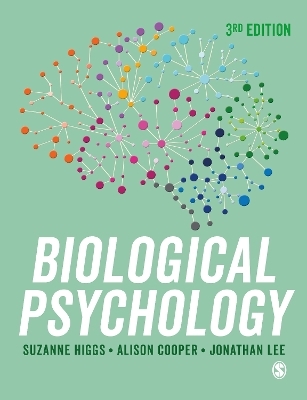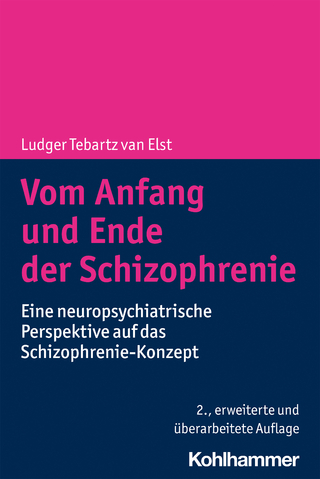
Biological Psychology
SAGE Publications Ltd (Verlag)
978-1-5297-9515-8 (ISBN)
Biological Psychology offers a highly visual, in-depth guide to the basic biological functions of the brain that you will need to learn throughout the course of your psychology degree. This edition boasts a revamped learning structure with a strong applied focus. This allows you to engage with biological psychology through a range of real world applications, getting you to apply your learning to conditions such as epilepsy, PTSD and Parkinson’s, and treatments such as gene therapy and brain-computer interfaces for spinal cord injuries.
Key features include:
• New ′real world applications′ boxes that help put theory into practice, showing you the human side of the science
• ′Focus on methods′ boxes that demonstrate the research methods you will use as a biological psychologist to uncover the workings of the brain
• Key debates to deepen your understanding of contemporary research and its impact
• Critical thinking questions
• Key points and glossary definitions to solidify your understanding of complex ideas and new terminology
• Further reading suggestions to help build your bibliography for assignments
• Video animations to help you grasp basic neuroanatomy and psychobiology
This book goes above and beyond to familiarise you with the links between biology and psychology, making it an essential read for psychology students at all levels.
Suzanne Higgs is Professor in the Psychobiology of Appetite at the University of Birmingham.
Alison Cooper is a Senior Lecturer at the University of Birmingham.
Jonathan Lee is Professor of Memory Neuroscience at the University of Birmingham.
Professor Suzanne Higgs has a degree in Psychology, Philosophy and Physiology from the University of Oxford, UK. During her degree she became fascinated by the effects of drugs on the brain and behaviour, which motivated her to pursue a PhD in Psychopharmacology at the University of Durham. After her PhD, she worked as a Postdoctoral researcher at the University of Oxford before moving to the University of Birmingham, UK to take up a faculty position in the School of Psychology. She has taught at all levels on the BSc in Psychology programme at Birmingham and has over 20 years of lecturing experience. She specialises in teaching psychopharmacology and the biological bases of motivated behaviours, in particular, the psychobiology of appetite, which is the topic of her research. Dr Alison Cooper’s interest in Neuroscience began during her Natural Sciences degree when she accidentally found herself studying the properties of neurones that form the circuit that controls grasshopper movement. She pursued an interest in understanding how the activity of neuronal cells could underpin behaviour for her PhD by researching the properties and functions of the parts of the brain that contribute to human motor behaviour. During this time, she became interested in neuropharmacology, and the link between synaptic neurotransmission and human function/ dysfunction has remained the focus of her thoughts. Following various Postdoctoral positions, she took an ever-greater role in Neuroscience education of undergraduates in various professional and non-professional undergraduate programmes. In recent years she has used her experience to extend her interest in education to the public who want to understand their own or others’ brains through public engagement in person and, globally, through online courses. Professor Jonathan Lee has a degree in Natural Sciences, specialising in Neuroscience, from the University of Cambridge. He has always been interested in the value of studying biological mechanisms in order to understand behaviour. This interest has been particularly focused on unconscious memories and their impact on behaviour. In his PhD and Postdoctoral research, also at the University of Cambridge, he studied the contribution of gene expression and pharmacological mechanisms in the processes underlying long-term fear and addictive drug memories. He has continued these research interests since moving to the University of Birmingham, using his research experience to teach an introduction to Biological Psychology in the BSc Psychology programme.
Chapter 1: What is Biological Psychology
Chapter 2: Structure and Communication in the Nervous System
Chapter 3: Drugs and the Nervous System: Psychopharmacology
Chapter 4: Development, Degeneration and Recovery in the Nervous System
Chapter 5: The Importance of Experience: Learning and Memory
Chapter 6: Sensory Systems
Chapter 7: Motor Control
Chapter 8: Emotional Behaviours
Chapter 9: Motivated Behaviours
Chapter 10: Psychological Disorders
| Erscheinungsdatum | 28.04.2023 |
|---|---|
| Verlagsort | London |
| Sprache | englisch |
| Maße | 189 x 246 mm |
| Gewicht | 1520 g |
| Themenwelt | Geisteswissenschaften ► Psychologie ► Biopsychologie / Neurowissenschaften |
| ISBN-10 | 1-5297-9515-X / 152979515X |
| ISBN-13 | 978-1-5297-9515-8 / 9781529795158 |
| Zustand | Neuware |
| Informationen gemäß Produktsicherheitsverordnung (GPSR) | |
| Haben Sie eine Frage zum Produkt? |
aus dem Bereich


